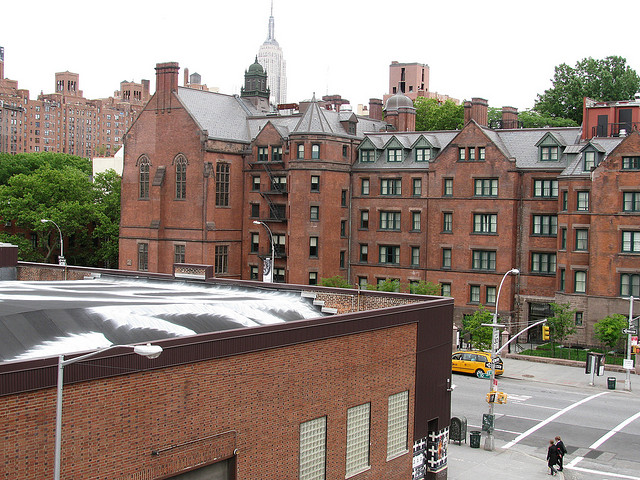NEW YORK (RNS) Nearly the entire full-time faculty at the Episcopal Church’s oldest seminary is battling with the school’s leadership, although neither side agrees whether the professors quit, were fired or staged a walkout.
Either way, the dispute revives a long-standing debate about the future of General Theological Seminary and the larger question of how storied seminaries should adapt to the changing culture.
GTS, the flagship seminary that has produced generations of bishops and noted theologians, is the only Episcopal seminary overseen by the national church. Last week, eight faculty decided to stop teaching classes, attending official seminary meetings or attending chapel services until they could sit down with the Board of Trustees.
The school reported 10 full-time faculty in its 2013-2014 annual report to the Association of Theological Schools, the main accrediting body for more than 270 seminaries and graduate schools. That left the student body of 70 students with just a handful of full-time faculty. A spokesperson for the school did not know the number of faculty and students for 2014-2015 before press time.
The dean and president, the Very Rev. Kurt Dunkle, wrote a letter to students saying the Board of Trustees accepted the eight faculty members’ resignations. But faculty member Andrew Irving wrote to students saying the professors never suggested they would resign.
“We wish to underline that we have not resigned,” Irving wrote, suggesting the group was seeking legal counsel. “Our letters did not say that we would resign. We requested meetings with the Board.”
The Rev. Ellen Tillotson, an Episcopal priest in Connecticut and a GTS board member, wrote that it has become clear that the eight faculty have been planning a walkout.
“When offered such an ultimatum, what were we to do? No, they never used the word ‘resign,'” she wrote. “But over and over they said they were unable to continue to do their jobs unless we met unmeetable conditions.”
On Tuesday (Sept. 30), the Board of Trustees made clear in a statement that the eight faculty had resigned, and the board said it’s willing to “meet with any former faculty member about the possibility of reconsidering the resignation.”
“The Board came to this decision with heavy hearts, but following months of internal divisions around the future direction of General Seminary … it has become clear that this is the best path forward in educating our students and shaping them into leaders of the church,” the statement said.
The eight faculty are charging that Dunkle shared a student’s academic records with people who were not authorized to see them, which would violate federal academic privacy standards. The faculty also say he speaks in ways that have made women and some minority groups uncomfortable on several occasions.
In their earlier letter, the eight faculty laid out concerns with the school’s leadership.
“It is our view that that the President has repeatedly shown that he is unable to articulate sensitively and theologically the issues that are essential to the thriving of the Body of Christ in its great diversity,” the professors wrote in an open letter. “Moreover his failure to collaborate, or to respond to our concerns when articulated has resulted in a climate that many of us find to be fraught with conflict, fear, and anxiety.”
In its statement, the Board of Trustees said it was “conducting an internal investigation into certain allegations of statements” pegged to Dunkle. “Further comment on the investigation, pending its outcome, would not help that process. We encourage everyone to withhold any further judgment or comment,” the board said.
GTS, however, is not the only seminary to face questions about its future in a rapidly shifting landscape of seminary life.
The Episcopal Divinity School in Cambridge, Mass., has also seen a battle erupt between its dean and faculty. Of the Episcopal Church’s 10 seminaries, several are facing financial challenges. Bexley Hall Seminary in Ohio affiliated with Seabury-Western Seminary in Illinois to form Bexley Seabury in 2013.
“There appears to be a profound lack of theological reflection in the process of change that the Dean has undertaken, which along with an impatience with relationship-building, that is strangely at odds with the mission of a seminary to form and prepare priests for mission in parish communities,” Andrew Gerns wrote in a post for Episcopal Cafe.
In 2013-2014, GTS enrolled 70 students and had $10.6 million in expenditures and $27 million in investments, according to ATS. GTS had faced about $40 million of debt that it was attempting to pay down through property sales and redevelopment.
Dunkle has been trying to address the school’s long-standing financial problems by tightening up operations. Dunkle, who was previously a lawyer, graduated from GTS in 2004 and worked as a diocesan administrator and as a parish priest.
GTS focused its energies redesigning several buildings on its Chelsea campus into the Desmond Tutu Conference Center in 2007, an effort that was supposed to bring hotel and conference revenue to the seminary. The anticipated revenue never materialized, and in 2012, the facility was sold to a developer.
The turmoil reflects a broader debate over the future direction of seminaries. Some seminaries are shifting away from the traditional three-year “residential” model to distance learning to save costs. Across denominations, many aspiring clergy will go to a local seminary for the bulk of their coursework before completing a degree at a denominational seminary.
Seminaries with low-residency programs often don’t require students give up their full-time jobs to move to another city. The questions at Episcopal seminaries mirror larger issues at Protestant seminaries, said Jason Byassee, senior pastor of Boone United Methodist Church and a fellow in theology and leadership at Duke Divinity School.
“Can an incarnational faith be taught in a disembodied way?” he asked. “Online education isn’t necessarily disembodied, but that’s the question everyone is having to wrestle with.”
KRE/MG END BAILEY





